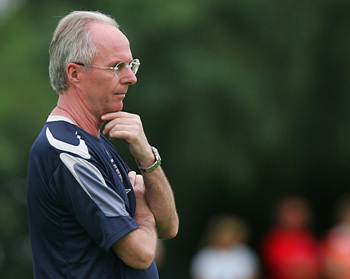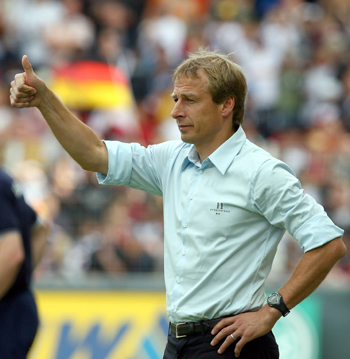A World Cup title can make a coach a legend. A loss can put him out of a job.
That's life at soccer's top level.

Sven-Goran Eriksson,
coach of England.[filephoto] |
At this year's World Cup, there are several men looking for their place in
history, including Luiz Felipe Scolari, Guus Hiddink, Sven-Goran Eriksson, Henri
Michel, Juergen Klinsmann, Marco van Basten and Oleh Blokhin.
Just about all the others will be hoping to achieve something special by
springing upsets at soccer's biggest event.
Scolari, the coach of Portugal, is looking to become the third coach to win
the World Cup twice, but the first to do it with two nations.
"I have a shot at that. Let's see how things go and whether I deserve it,"
said Scolari, who led his native Brazil to its fifth title in South Korea and
Japan four years ago.
Vittorio Pozzo and Vicente Italo Feola have also won two titles. Pozzo
coached Italy to titles in 1934 and '38, while Feola led Brazil to back-to-back
titles in 1958 and '62.
Portugal, which reached the final at the 2004 European Championship at home,
does have a chance to win its first world title. The team is led by Luis Figo,
Cristiano Ronaldo, Deco and Pauleta, and plays in a relatively easy group with
Mexico, Iran and Angola.
Hiddink has never won a World Cup, but he led the Netherlands to the
semifinals in 1998, and then took South Korea to the last four in 2002. The
Dutchman is now coaching Australia, a team few give a chance to make it out of a
group that includes Brazil, Croatia and Japan.
"We are happy to have qualified, but we are not here to make up the numbers,
and want to spring a surprise," Hiddink said hopefully.
Michel will try to equal Hiddink's past success by taking Ivory Coast to the
semifinals. The Frenchman reached the last four at the 1986 World Cup with
France.
But drawn into the toughest group along with Argentina, the Netherlands and
Serbia-Montenegro, Michel's job won't be easy despite the attacking talents of
Didier Drogba.
Klinsmann, Van Basten and Blokhin are trying to join the ranks of former star
players who have won the title as a coach. Mario Zagallo and Franz Beckenbauer
are the only men to have won the World Cup as players and coaches.
Van Basten, who coaches the Netherlands, has never won the title, but he
played for the Dutch when the team won the 1988 European Championship. His team
will be tested early in its difficult group.
"If you start out with a tough group, you immediately know what you are
worth," Van Basten said. "We know it isn't going to be an easy job."

Juergen Klinsmann
coach of Germany gives a thumbs up during an international friendly soccer
match against Luxembourg in Freiburg May 27, 2006.
[Reuters] |
Klinsmann helped West Germany win its third World Cup title in 1990, and
he'll be coaching the hosts this time.
His two-year contract is due to end after the World Cup, and anything short
of a spot in the final is likely to keep him from being offered an extension.
But that doesn't seem to bother him.
"If I am not there, someone else will be," Klinsmann said. "But the
federation has to have a philosophy. It has to have a line to be followed."
Germany will open the tournament on June 9 against Costa Rica. The three-time
champions later play Poland and Ecuador in Group A.
Blokhin played for the Soviet Union, and now lead's Ukraine and star striker
Andriy Shevchenko. The former Soviet republic is making its debut at this year's
tournament and is grouped with Spain, Tunisia and Saudi Arabia.
Roger Lemerre has won European titles on two continents, leading France to
the 2000 European Championship and Tunisia to the 2004 African Cup of Nations.
The Frenchman will be trying add a world title to his resume by coaching Tunisia
at the World Cup.
Eriksson, the first foreigner to coach England, is one of the few men at the
World Cup that doesn't have to worry about job security when the tournament is
over. He already knows he's leaving.
The Swede has been guiding England for five years and led the team to the
quarterfinals at the last World Cup and the 2004 European Championship.
But sensationalist coverage in the British tabloids, which exposed Eriksson's
romantic affairs and tricked him into talking to an undercover reporter posing
as an Arab sheik, hastened his early departure. He will be replaced by Steve
McClaren.
"Sometimes I get fed up reading about my private life, what I did, what I
said, and I think people in general feel that way," Eriksson said earlier this
year. "We should talk about football, but unfortunately that's difficult in this
country."
Everyone will be talking about football _ soccer _ through the July 9 final
in Berlin. Will they be talking about a legendary coach, too?